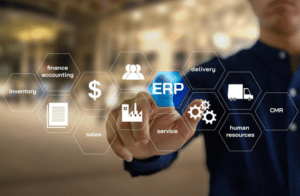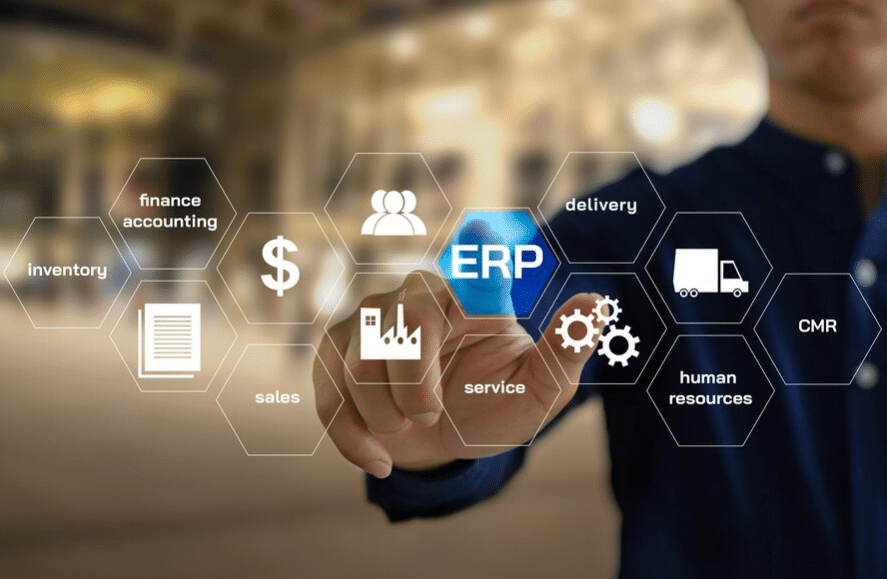Introduction
erp.balitteknologikaret.co.id | ERP Programs – In today’s fast-paced business environment, staying competitive and efficient is paramount. Enterprise Resource Planning (ERP) programs have emerged as a transformative solution, helping organizations streamline operations, optimize resources, and make informed decisions. This comprehensive guide takes an in-depth look at ERP programs, from their origins and evolution to their core components, benefits, and future trends.

Understanding ERP Programs
The Genesis of ERP: A Response to Complexity
Enterprise Resource Planning (ERP) programs have a rich history dating back to the 1960s and 1970s. During this era, organizations began to experience the challenges of managing complex business processes, including inventory control, order management, and financial reporting. The traditional manual methods were proving inadequate to cope with the growing complexity of business operations.
In response, ERP systems were developed to provide a comprehensive solution that integrated various business functions into a unified software platform. These systems aimed to enhance data visibility, automate routine tasks, and facilitate better decision-making.
The Evolution to Modern ERP
ERP programs have come a long way since their inception. While the earliest systems primarily focused on automating financial processes, modern ERP solutions are expansive, encompassing a wide range of business functions. They integrate everything from accounting and human resources to supply chain management and customer relationship management (CRM).
Today’s ERP programs are often deployed as cloud-based solutions, offering scalability, accessibility, and real-time data sharing across an organization. This evolution has made ERP programs a cornerstone of modern business operations.
Key Components of ERP Programs
Financial Management
- General Ledger
ERP programs include a robust general ledger module that serves as the foundation for financial data management. It facilitates automated journal entries, financial reporting, and multi-currency support. - Accounts Payable and Receivable
Efficient management of accounts payable and receivable processes is crucial for cash flow management. ERP programs automate invoice processing, payment tracking, and reconciliation, improving financial efficiency. - Budgeting and Forecasting
ERP programs provide advanced budgeting and forecasting tools, enabling organizations to create accurate financial projections, monitor budget performance, and make data-driven financial decisions.
Supply Chain Management
- Inventory Control
Effective inventory management is essential for minimizing carrying costs and ensuring products are available when needed. ERP programs offer real-time visibility into inventory levels, demand forecasting, and automated reorder points. - Order Processing
Streamlined order processing is a key feature of ERP programs. They automate order creation, track order status, and optimize order routing, leading to improved customer satisfaction and operational efficiency. - Procurement
ERP programs help manage supplier relationships, track procurement costs, and ensure timely deliveries. They support supplier negotiations, procurement strategy optimization, and vendor performance tracking.
Human Resources and Payroll
- Human Capital Management
ERP programs include modules for human capital management (HCM), encompassing employee onboarding, performance management, and talent development. They ensure compliance with labor laws and support effective workforce management. - Payroll Processing
Efficient payroll processing is a critical aspect of HR operations. ERP programs simplify payroll calculations, tax compliance, and employee compensation management.
Customer Relationship Management (CRM)
- Customer Data Management
CRM capabilities within ERP programs centralize customer data, providing a comprehensive view of interactions and preferences. This enhances customer service and supports personalized engagement. - Sales and Marketing Automation
ERP programs offer sales and marketing automation tools that help businesses manage leads, track sales pipelines, and execute targeted marketing campaigns for improved sales effectiveness. - Customer Support
Efficient customer support is essential for customer satisfaction. ERP programs enable organizations to manage customer inquiries, track service requests, and provide timely support.
Business Intelligence and Analytics
- Reporting and Dashboards
ERP programs include advanced reporting and dashboard capabilities. They allow organizations to create custom reports, visualize key performance indicators (KPIs), and derive actionable insights from data. - Data Analytics
Advanced analytics tools within ERP programs provide the ability to analyze historical data, identify trends, and make data-driven decisions. Predictive analytics and machine learning are increasingly integrated for enhanced insights.
Benefits of Using ERP Programs
Streamlined Operations
ERP programs centralize business processes, eliminating the need for disparate systems and manual data entry. This streamlines operations, reduces errors, and improves overall efficiency.
Enhanced Visibility
Real-time data access and analytics tools offer unparalleled visibility into operations. This visibility enables organizations to identify trends, make informed decisions, and respond quickly to market changes.
Scalability
ERP programs are highly scalable, adapting to the changing needs of growing organizations without the need for extensive customization or IT infrastructure investments.
Improved Financial Management
ERP programs ensure accurate and up-to-date financial records. This leads to better financial planning, reduced financial risks, and improved compliance with regulations.
Customer-Centric Approach
With integrated CRM capabilities, ERP programs empower organizations to adopt a customer-centric approach. This leads to improved customer satisfaction, increased loyalty, and higher sales.
Cost Savings
By consolidating multiple systems and automating processes, ERP programs help organizations reduce operational costs. The cloud-based nature of ERP eliminates the need for large upfront investments in hardware and software licenses.
Security and Compliance
ERP programs place a strong emphasis on security and compliance. They adhere to industry standards and regulations, providing peace of mind that sensitive data is protected.
Implementation Considerations
System Selection
Selecting the right ERP program is crucial to the success of implementation. Consider factors such as scalability, compatibility with existing systems, and the vendor’s track record.
Data Migration
Efficient data migration is essential when transitioning to an ERP program. Ensure that data is accurately transferred, and historical records are preserved.
Training and Change Management
Proper training and change management are critical for successful ERP implementation. Ensure that employees are adequately trained and prepared for new processes.
Integration
If you are using an ERP program as part of an integrated suite, ensure seamless integration with other modules like finance, sales, and CRM to facilitate end-to-end business processes.
Future Trends in ERP Programs
Artificial Intelligence and Machine Learning
AI and ML will play an increasingly significant role in ERP programs, offering advanced predictive analytics, automation of routine tasks, and enhanced data insights.
Enhanced Mobility
The trend of remote work and mobile operations will lead to the continued enhancement of mobile capabilities within ERP programs, allowing users to access critical data and functions from anywhere.
Internet of Things (IoT) Integration
Integration with IoT devices and data will enable real-time monitoring of assets, equipment, and processes, providing valuable insights for decision-making.
Blockchain Integration
Blockchain technology has the potential to enhance security, transparency, and trust in transactions within ERP programs, especially in supply chain management and financial operations.
Industry-Specific Solutions
ERP program vendors may develop industry-specific solutions tailored to the unique needs of various sectors, such as manufacturing, healthcare, and retail.
Conclusion
ERP programs have evolved into comprehensive, flexible, and cloud-ready solutions that empower organizations to streamline operations, enhance customer relationships, and make data-driven decisions. Their continuous innovation, scalability, and adaptability make them invaluable assets for organizations across various industries and sizes.
As we look to the future, ERP programs are poised to continue transforming business operations. With emerging technologies, increased mobility, and a focus on industry-specific solutions, ERP programs remain at the forefront of business technology, helping organizations thrive in the digital age.

Leave a Reply